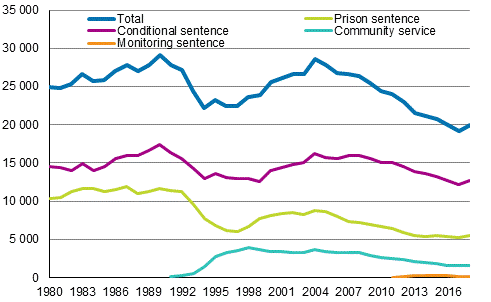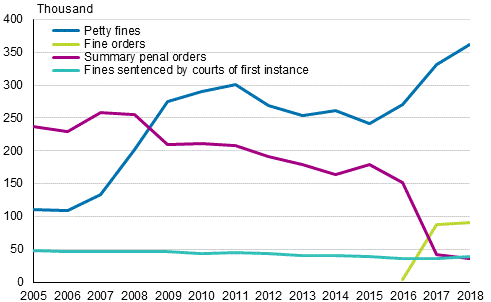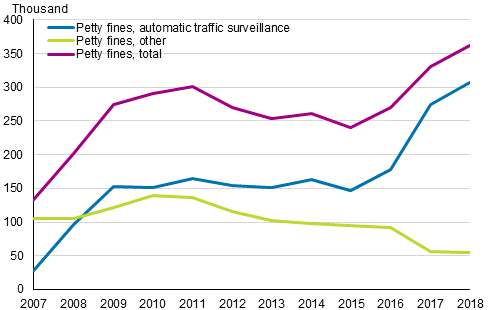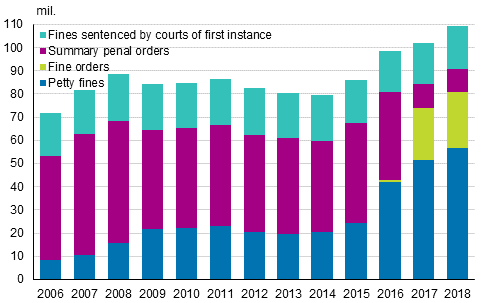Published: 26 September 2019
Four per cent more imprisonments sentenced than one year ago
According to Statistics Finland's data, 4.4 per cent more sentences of imprisonment were passed in 2018 than one year earlier. A total of 20,008 sentences of imprisonment were passed. The downward trend in the number of imprisonments that has continued since 2004 stopped in 2018. Twenty-eight per cent of imprisonments were sentences carried out in prison. In all, 64 per cent of imprisonments were conditional.
Imprisonment in 1980 to 2018, number

In 2018, a total of 5,566 sentences of unconditional imprisonment were passed. Eleven of these were life imprisonments and 479 were sentences where previous unconditional imprisonment was regarded as a sufficient sanction. Seventy-one sentences of fixed-term unconditional imprisonment of eight years or longer were passed. Fifty-five per cent of them were sentences for manslaughter, murder, killing or infanticide and 44 per cent for narcotics offences. Forty-two per cent of all unconditional imprisonments were for under three months. Of them, 46 per cent were results of traffic offences, 31 per cent of property offences and eight per cent of offences against life and health. The average unconditional imprisonment was 11.2 months in duration.
In 2018, a new punishment for repeat offenders of serious offences was introduced, combination sentence. It consists of unconditional imprisonment and a supervision term after the prison term. In 2018, four people received a combination sentence.
Altogether 12,692 sentences of conditional imprisonment were passed in 2018, four per cent more than one year earlier. The average duration of conditional imprisonment was 4.3 months. Around 37 per cent conditional imprisonments were caused by aggravated drunken driving. The second most sentences of conditional imprisonment were passed for assaults.
Unconditional imprisonment of at most six months can be passed as a monitoring sentence. In 2018, a total of 144 unconditional imprisonments were converted into monitoring sentences and their average duration was 2.9 months.
Unconditional imprisonment of under eight months can be sentenced as community service if it is not caused by refusing military or civil military service or a civil military service offence. Thirty-one per cent of all convertible unconditional imprisonments were converted into community service in 2018. Community service was clearly used most when passing a sentence for drunken driving. The average duration of community service was 98 hours.
Over 56,000 sentences were passed in courts of first instance
The district courts issued 56,160 sentences in 2018. There were nearly 10 per cent more fines passed by district courts than one year earlier, amounting to 39,100 (incl. fines and petty fines sentenced in court, supplementary day fines and disciplinary fines). Nineteen per cent of day fines passed by district courts were caused by drunken driving, 14 per cent by petty thefts and 11 per cent by assaults. A majority of disciplinary fines passed in addition to conditional imprisonment, over 92 per cent, were caused by aggravated drunken driving. Fines by a summary penal order were sentenced 35,540 times. The number of fine orders issued by the police was 91,000. About 44 per cent of summary penal orders and fine orders were caused by endangerment of traffic safety. The number of summary penal orders and fine orders caused by endangerment of traffic safety were previously decreasing but in 2018 there were nearly as many as in 2017.
Fines sentenced by courts of first instance, summary penal orders, fine orders and petty fines in 2005 to 2018, number

In 2018, over nine per cent more petty fines were issued than one year before, amounting to 361,800. Of them, 85 per cent were a result of camera surveillance. The number of petty fines issued based on camera surveillance was 12 per cent higher than in 2017. Nearly one-half of the petty fines issued in 2018 amounted to EUR 170 and slightly over a quarter amounted to EUR 140. The vast majority of the petty fines, 95 per cent, were results of traffic offences. The number of petty fines issued for traffic offences was 11 per cent higher in 2018 than one year before.
Petty fines 2007–2018, number

The accrual of all fines (incl. fines and petty fines sentenced in court, supplementary day fines and disciplinary fines) amounted to over EUR 109.1 million in 2018, good seven per cent more than a year ago. Over 31,000 more petty fines were issued, and the accrual of fines was EUR 56.7 million, 10 per cent higher than in 2017. The accrual of fines for summary penal orders was EUR 9.7 million and that of fine orders EUR 24.3 million. The accrual of fines sentenced in courts of first instance in 2018 was 6.7 per cent higher than a year ago. In total, courts of first instance issued fines to the value of EUR 18.5 million.
Total accrual of fines for fines sentenced by courts of first instance, summary penal orders and fine orders and petty fines in 2006 to 2018, EUR

Source: Prosecutions, sentences and punishments 2018, Statistics Finland
Inquiries: Laura Lipasti 029 551 3041, rikos@stat.fi
Director in charge: Jari Tarkoma
Updated 26.9.2019
Official Statistics of Finland (OSF):
Prosecutions, sentences and punishments [e-publication].
ISSN=2343-1679. 2018. Helsinki: Statistics Finland [referred: 28.2.2026].
Access method: http://stat.fi/til/syyttr/2018/syyttr_2018_2019-09-26_tie_001_en.html

